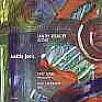Sandy Prager: My dad was a trombone player who played and toured in big bands. He loved Miles, Diz and Bird. So I was weaned on bop and standards. My father was also my first teacher. But it was on trumpet, not guitar! I got pretty good, too. Until, when I was about 12, I discovered that the girls liked the guitar players more. So I switched!
Dad had me transcribing Charlie Parker solos when I was about 11. I loved it! But I must say that I loved even more finding out about the omnibook (Bird's transcribbed solos). It sure helped my ears a lot! So I learned standards and improvisation and composition at the University of Miami while in junior high and high school. When I got to Berklee, I started stretching my ears musically. Then I heard Ralph Towner's solo album. I switched from electric to classical and 12-string. I couldn't (and still don't) believe how subtle but powerful Ralphs' playing is!
Sandy Prager: I'm currently using an Alan Carruth classical, which is simply unbelievable, and getting better with age. And an old (1967, I think) Guild F-212 12-string.
Sandy Prager: To perform in concert or festival settings as much as I can. And to keep going!
Sandy Prager: My most recent release is "Seattle Joe's", which is a mixture of trio pieces and solo pieces. The trio is John Lockwood on bass and Jerry Leake on percussion and tabla. I wrote the tunes, but boy can those guys play over them! It's a real joy working with such wonderful players. I can go anywhere I want and they'll be right there!
Sandy Prager: A lot of my stuff is through composed, or just free improv. Though I will work on pieces paperwise pretty rigorously. Especially the more "20th. century" type works, like the guitar/flute/oboe trio I'm currently working on.
Sandy Prager: I have a DAT recorder at home that I use. But mainly so I can hear how I'm playing something that needs working on. For more serious recording, I'll always go in the studio.

Sandy Prager: Except for distribution, I've always made out better doing it myself using investor money then any contracts I've been offered. I have a "go in the studio and play" mentality. I don't overdub, and I usually only do two or three takes for each piece. I make sure when I go in, I'm ready! So my costs are embarressingly low!
Sandy Prager: That's a tough one to answer since all I know is being an independent musician. I do have management and that's a great help. But generally, I do the legwork and local stuff, and he goes for the out of town gigs. I suppose in self-producing a recording, I have to make sure of items that I wouldn't if I were "signed". Stuff like artwork, graphic design, and mastering.